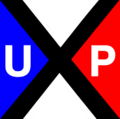Popular Unity (Chile)
| Popular Unity Unidad Popular | |
|---|---|
 | |
| Founded | October 9, 1969 |
| Dissolved | 1981 |
| Preceded by | Popular Action Front |
| Headquarters | Santiago |
| Political position | Left-wing |
| Colours | Red |
| Anthem | Venceremos |
|
Politics of Chile Political parties Elections | |
The Popular Unity (Spanish: Unidad Popular, UP) was a left-wing political alliance in Chile that stood behind the successful candidacy of Salvador Allende for the 1970 Chilean presidential election.
History
Successor to the FRAP coalition, it originally comprised most of the Chilean Left: the Socialist Party, the Communist Party, the Radical Party, the Social Democratic Party, the Independent Popular Action and MAPU (Movimiento de Acción Popular Unitario). They were later joined in 1971 by the Christian Left and in 1972 by the MAPU Obrero Campesino (a splinter group). UP also initially included the moderate Party of the Radical Left, but in 1972 joined the opposition (inside the Confederation of Democracy).
UP's leader, Salvador Allende, was a Marxist who co-founded Chile's Socialist Party. His slight plurality in the election resulted in his confirmation as president by the National Congress of Chile. The loose and conditional support from the Christian Democratic Party that made this confirmation possible soon disintegrated, as did centrism of any viable kind in an atmosphere of increasing political polarization. The Revolutionary Left Movement clashed with the conservative and establishment forces, while armed right-wing elements plotted to destabilize the government with support from the Nixon administration. The Unidad Popular coalition itself experienced political conflicts. Generally, the Communist Party, the Radical Party and later MAPU/OC advocated more cautious policies, whereas a part of the Socialist Party supported more radical changes and were often supported by MAPU and Christian Left.[1][2]
The Pact of the Popular Unity (Pacto de la Unidad Popular) was signed on 26 December 1969 in Santiago by following representatives of political parties:
- Luis Corvalán, General Secretary of the Communist Party
- Aniceto Rodríguez, General Secretary of the Socialist Party
- Carlos Morales, President of the Radical Party
- Esteban Leyton, General Secretary of the Social Democratic Party
- Jaime Gazmuri, General Secretary of the Popular Unitary Action Movement
- Alfonso David Lebón, President of the Independent Popular Action
In August 1973 the Christian Democrats cooperated with the right-wing National Party in the congressional protest that set the stage for the Chilean coup of 1973, the effective end of the UP government and —for 17 years— of democracy in Chile.
Composition
Electoral results
| Chamber of Deputies | |||||
| Election year | # of overall votes |
% of overall vote |
# of overall seats won |
+/– | |
|---|---|---|---|---|---|
| 1973 | 1,605,170 (#2) | 44.23 | 63 / 150 |
| |
| Senate | |||||
| Election year | # of overall votes |
% of overall vote |
# of overall seats won |
+/– | |
|---|---|---|---|---|---|
| 1973 | 940,512 (#2) | 42.75 | 11 / 25 |
| |
Symbols
-

1969–1972
-

1972–1973
-

1973
See also
References
- ↑ Kenneth M. Roberts, Deepening democracy?: the modern left and social movements in Chile and Peru, p.301
- ↑ Simon Collier, A History of Chile, 1808-1994